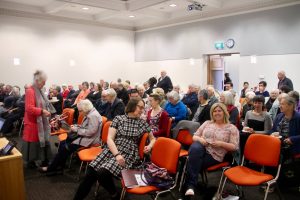The Centre was pleased to host Tanya Evans of Macquarie University who gave a public lecture last week. While this was Tanya’s first trip to New Zealand, we also welcomed back a more regular visitor from Australia, Kristyn Harman (University of Tasmania) accompanied by her partner, Nick Brodie.
Academics are encouraged to make their research more “impactful”, which for Humanities scholars is often to get their research out beyond the narrow academic enclaves we work in. Presentations from all of three of the visitors above were relevant to this theme. Tanya, Director of Macquarie’s Research Centre for Applied History, discussed ‘The Emotions of Family History’, looking at why family historians and genealogists undertake their research, and how such research informs wider community understanding of, and individuals’ emotional connection to the past. In her investigations, Tanya interacts with family historians, with her research having far more impact than that of more siloed academic history.
Kristyn was in Dunedin to launch her new book, Cleansing the Colony: Transporting Convicts from New Zealand to Van Diemen’s Land (published by Otago University Press) which examines the more than 100 people sent from New Zealand into the Australian penal institutions. Kristyn also gave a lecture on these convicts to the Tuesday Club at Toitū: Otago Settlers Museum last week. Although most of the Club are retired and from many walks of life, they were keen, attentive, and intellectually engaged, with Kristyn’s talk attracting their largest crowd of the year.
Nick Brodie is an established Australian popular historian, author of Kin, 1787, and The Vandemonian War. Although he has his own academic background in history and archaeology, he now reaches a much larger market through well-researched but accessible books. Nick shared his own publishing experiences in a seminar to both staff and postgraduates at the university, with tips on how to make history relevant and engaging for non-academic audiences.


